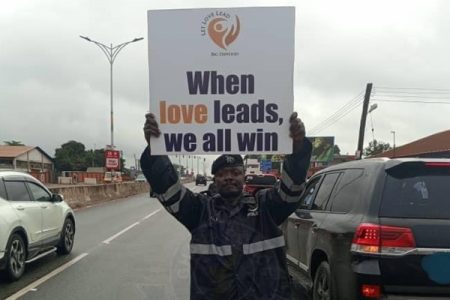The right to freedom of assembly and demonstration is a fundamental pillar of democracy.
In Ghana’s Fourth Republic, numerous protests have taken place, some of which, unfortunately, were marred by violence.
While demonstrators have been responsible for some of these incidents, the police have also faced accusations of excessive force in certain situations. However, the balance between the right to protest and the responsibility to maintain public safety is crucial.
Over the past five years, the Ghana Police Service has demonstrated significant professionalism and restraint, even when faced with extreme provocation during protests.
A departure from peaceful demonstrations
Recent demonstrations organized by the Democracy Hub and Concerned Citizens Against Illegal Mining revealed a concerning trend.
While peaceful assembly is a democratic right, some protesters engaged in unlawful activities, such as blocking major roads and deliberately provoking police officers.
During a protest at the 37 Military Hospital junction, demonstrators blocked a vital road, endangering public safety and potentially risking the lives of individuals needing urgent medical care.
Such actions not only infringe on the rights of others but also strain law enforcement’s efforts to maintain peace.
In some cases, protesters physically pushed police officers, attempted to breach barricades, set fires in the streets, and verbally abused security personnel.
These provocations mark a stark departure from peaceful protests and pose a serious threat to public safety.
“Environmental Prayer Walk” by Catholic Archdiocese
On the other hand, the Catholic Archdiocese also led a peaceful “Environmental Prayer Walk” to raise awareness about the urgent need to protect Ghana’s environment and call for an end to illegal mining, commonly known as galamsey.
The walk brought together participants from all walks of life, led by priests, in a calm, prayerful procession through the heart of Accra.
Beginning at the Holy Spirit Cathedral, the group proceeded along Castle Road to the Old Electoral Commission Office at Ridge, then to the AU Roundabout, and continued along Independence Avenue to the Ako Adjei Interchange.
The participants then made their way to the National Police Headquarters Traffic Light, traversed Josif Broz Tito Avenue, and concluded the walk at Christ the King Catholic Church on Jawaharlal Nehru Road.
Throughout the walk, worshippers held placards with messages advocating for an immediate end to galamsey, emphasizing its harmful effects on Ghana’s natural resources.
The gathering remained peaceful and united in purpose, reflecting a shared commitment to protect the environment.
Catholic worshippers, environmental activists, and concerned citizens participated, all standing together in their plea to halt the environmental degradation caused by illegal mining.
Priests participating in the walk reaffirmed the Catholic Bishops’ Conference’s dedication to combating galamsey, emphasizing the Church’s firm stance on the issue.
This prayer walk is part of the Catholic Church’s larger mission to inspire public support for environmental protection, as illegal mining continues to pose a serious threat to Ghana’s ecosystems and water resources.
The power of peaceful protests
Protests, when conducted peacefully, can be powerful catalysts for change.
History is filled with examples of movements that have brought about significant progress through peaceful means—transforming societies and influencing policies.
Violent protests, however, are not only counterproductive but also detrimental to societal development.
These acts of violence undermine the message of the protest and harm the very cause demonstrators seek to champion.
Violence endangers lives and detracts from the legitimate concerns being raised.
A peaceful protest demonstrates unity, purpose, and discipline, sending a strong message that citizens are committed to change without resorting to chaos.
In contrast, violence erodes this unity and can alienate potential supporters, including those in positions of influence who could drive the desired change.
Commendation for police restraint
Despite the provocations, the police demonstrated commendable restraint and professionalism.
Their handling of the Democracy Hub protests serves as an example of their commitment to upholding law and order while respecting citizens’ rights to protest.
It is essential to acknowledge that in situations where law enforcement is faced with aggression, the use of reasonable force is a legal and internationally accepted standard.
Ghana, like many other nations, has laws that govern the use of force by the police, including the 1960 Criminal Procedure Code, the 1960 Criminal Code, and the 2012 Criminal Offences Act. These regulations ensure that any use of force is measured and aligned with the law.
The need for responsibility during protests
It is important for protesters to understand that while they have the right to assemble; this right must be exercised responsibly. Provoking the police or engaging in illegal activities not only undermines the purpose of the protest but can also lead to violence, which could escalate into chaotic situations.
Critics of the arrests and subsequent remanding of protesters must also recognize that law and order are enforced in democratic nations worldwide. Ghana is not unique in ensuring public safety is maintained during demonstrations.
As the country moves forward, it is essential to strike a balance between protecting democratic freedoms and upholding the law. Protesters must be reminded of the importance of peaceful assembly, while the police continue to exercise professionalism and restraint in maintaining order.
Violence: An obstacle to progress
Violent protests, regardless of their intentions, are inimical to progress.
They derail efforts to bring about meaningful change, create divisions within society, and destroy the very foundations upon which future development relies.
While it is essential for citizens to exercise their right to protest, this must be done in a peaceful and constructive manner.
Only then can true progress be made, and the goals of justice, equality, and social reform be achieved.
Progress through peaceful change
The success of a protest lies in its ability to bring about positive change without resorting to violence.
Peaceful protests foster dialogue, understanding, and the possibility of real transformation, while violence only serves to disrupt and undermine the progress sought by demonstrators.
As Ghana continues to develop, the power of peaceful protest remains a vital tool for societal growth and justice
By ELVIS DARKO, Accra
- Enterprise Life launches improved education investment solution - 31 March 2025
- Access Bank Ghana launches “Fa Ketewa Bɛgye Kɛseɛ” promo - 31 March 2025
- President Mahama Calls for unity at Eid Al-Fitr celebration - 31 March 2025

